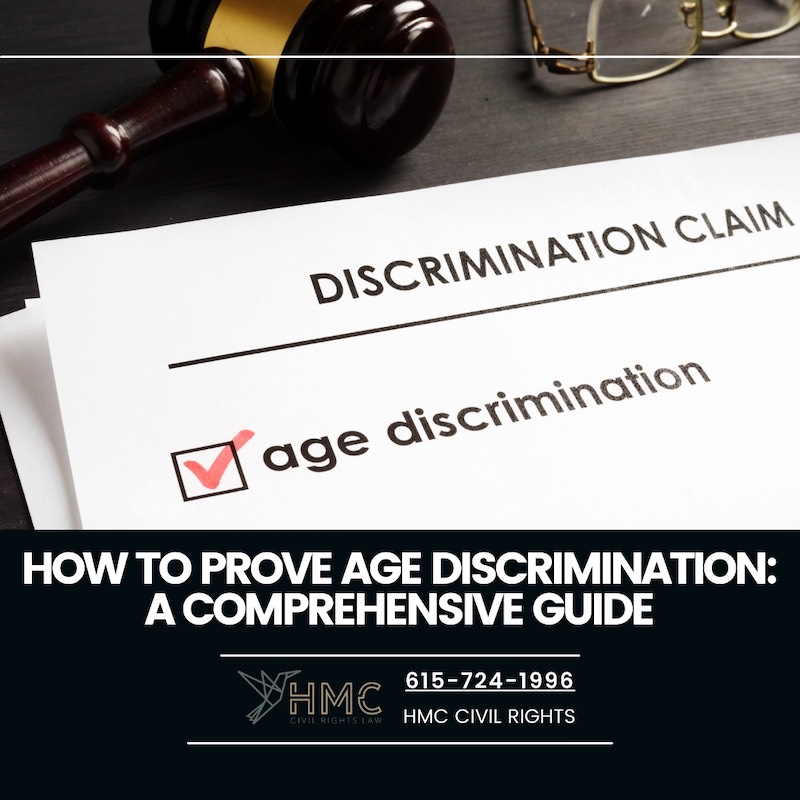
Discover the steps to prove age discrimination and protect your rights in this comprehensive guide. Learn how to gather evidence, seek legal assistance, and navigate the legal complexities of age discrimination cases.

Age discrimination is a pressing issue faced by individuals worldwide, impacting their professional and personal lives. In this comprehensive guide, we will explore the various aspects of age discrimination and provide valuable insights on how to prove age discrimination.
Whether you are a victim seeking justice or simply interested in understanding this topic better, this blog post will equip you with the knowledge needed to navigate this challenging situation.
Let’s explore the steps and resources you can utilize to establish age discrimination and protect your rights.
Age discrimination refers to the unfair treatment of individuals based on their age, mainly targeting those 40 years or older. It can manifest in different forms, such as direct discrimination, indirect discrimination, harassment, or victimization [5].
Recognizing the signs and impacts of age discrimination is crucial in building a solid case.
Age discrimination involves treating an applicant or employee less favorably because of his or her age. The Age Discrimination in Employment Act (ADEA) forbids age discrimination against people who are age 40 or older. pic.twitter.com/EYdrhbjuWy
— Work 4 Change, LLC (@Work4ChangeLLC1) March 1, 2022
To prove age discrimination, you need to compile compelling evidence that substantiates your age discrimination claim. The following steps can help you build a robust case:
Keep records of any negative comments or remarks about age by coworkers, supervisors, or employers [3].
Collect your performance reviews, highlighting positive feedback and strong job performance, to counter any claims of inadequate performance [3].
Investigate other age discrimination lawsuits within your industry or company to establish a pattern of discriminatory behavior [3].
Identify potential witnesses who can support your case by providing testimonies or evidence of ageist treatment [3].

Once you have gathered sufficient evidence, you must file a charge with the appropriate agency to initiate the legal process. This typically involves contacting the Equal Employment Opportunity Commission (EEOC) [3].
Navigating the legal complexities of age discrimination cases often requires the expertise of experienced attorneys specializing in employment law. Hiring an attorney who is well-versed in age discrimination cases can significantly enhance your chances of success [3][8][9].
To establish age discrimination, you must demonstrate that your age was a significant factor in the adverse employment action taken against you. In other words, you must show that the adverse action would not have occurred “but for” your age [8].
It is essential to be aware of the exceptions and defenses that employers may raise when faced with age discrimination allegations. Certain circumstances, such as age-related job requirements or positive actions to address under-representation, may be considered lawful. Familiarize yourself with the applicable laws and consult legal professionals to understand the specific details of your case [5].
Proving age discrimination requires thorough documentation, gathering strong evidence, and seeking legal assistance. By understanding the steps in proving age discrimination, you can protect your rights and pursue justice.
Remember, age discrimination affects individuals and perpetuates harmful stereotypes and prejudices. Together, we can strive for inclusive societies that value and respect individuals of all ages.
If you find yourself in a situation involving age discrimination, do not hesitate to contact civil rights litigation law firms such as HMC Civil Rights, who specialize in fighting for justice on behalf of our clients.
What is age discrimination in employment?
Age discrimination in employment refers to the unfair treatment of individuals based on their age. It occurs when an employer makes biased employment decisions, such as hiring, firing, promotions, or layoffs, based on an individual’s age, mainly targeting those who are 40 years or older.
Are younger employees also protected from age discrimination?
Yes, younger employees are protected from age discrimination as well. At the federal and state levels, age discrimination laws prohibit discrimination based on age, regardless of whether the individual is younger or older.
What is the Equal Employment Opportunity Commission’s (EEOC) role in age discrimination cases?
The EEOC is responsible for enforcing federal laws prohibiting workplace discrimination, including age discrimination. They handle age discrimination claims and investigate allegations of discrimination. Filing a complaint with the EEOC is often the first step in pursuing an age discrimination claim.
Does federal law cover age discrimination?
Yes, age discrimination is covered by federal law. The ADEA, enacted in 1967, is the primary federal law prohibiting age discrimination in employment. It applies to employers with 20 or more employees and protects individuals 40 years of age or older.
Can I file an age discrimination claim under state laws?
Yes, many states have laws that provide additional protections against age discrimination in employment. These state laws may cover a broader range of employers or offer additional remedies for age discrimination claims. Consulting with an age discrimination lawyer familiar with state laws can help determine the best course of action.
Can age discrimination occur in various conditions of employment?
Yes, age discrimination can occur in various conditions of employment, including hiring, firing, promotions, job assignments, layoffs, training opportunities, and compensation decisions. Any adverse employment action based on age can be considered age discrimination.
What is required to prove age discrimination in employment?
To prove age discrimination, you generally need to show that you are 40 years or older, suffered an adverse employment action (such as being fired, demoted, or denied a promotion), and that age was a significant factor in the adverse action. Gathering evidence, such as performance reviews, witness testimonies, and documenting age-related comments, can strengthen your case.
What should I do if I believe I’ve suffered age discrimination in employment?
If you believe you have suffered age discrimination in employment, it is essential to take prompt action. Start by documenting the incidents and gathering evidence to support your claim. Consult an age discrimination lawyer to understand your rights and explore your options, including filing a complaint with the EEOC or pursuing legal action.
Remember, this FAQ is for informational purposes only and should not be considered legal advice. Consulting an experienced age discrimination lawyer is recommended to address specific concerns related to your situation.
Contact us today by filling out the form below or calling our office at 615-724-1996.
Let us stand by your side and work together to create a more inclusive and accepting society. Remember, your voice matters, and we are here to amplify it. Request your free case evaluation now! Still not convinced? Check out our Workplace Discrimination services page to learn more!